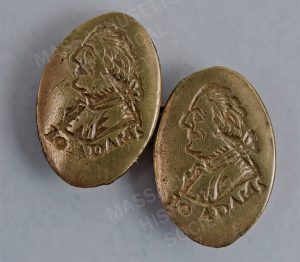By Sara Georgini, Series Editor, The Papers of John Adams

Back at the capital, Thomas Jefferson pondered the challenge of how to lead that shift. “The storm is over, and we are in port,” Jefferson wrote to Samuel Adams on 29 March. “The ship was not rigged for the service she was put on. we will shew the smoothness of her motions on her republican tack.” The election of 1800 evolved American democracy in big ways. Electioneering dominated the press, as Adams’ Federalist Party supporters continuously clashed with their rivals, Jefferson’s Democratic-Republicans. Both camps diverged on domestic and foreign issues; Adams’ unpopularity surged as he enforced the Alien and Sedition Acts and loudly defended the need for peace with France. As voting stretched from September to December, party cleavage ended the Federalists’ hold on a congressional majority. The whole electoral system rebooted, too. States’ methods for choosing presidential electors changed, igniting confusion and popular concern. When Jefferson tied with Aaron Burr for the top seat, the House of Representatives slogged through nearly a week of balloting to break the deadlock in the Virginian’s favor. In all the political chaos, a silver lining glimmered: Adams and Jefferson’s joint commitment to a peaceful transfer of power between parties pointed to the young democracy’s potential.
In its aftermath, citizens like Abigail Adams, Hannah Phillips Cushing, and Margaret Bayard Smith leaned in to private letters where they weighed the election’s role in history. Cushing, wife of U.S. Supreme Court justice William Cushing, lamented Federalists’ waning “judgment and prudence.” And was this election a harbinger, she wondered, of how presidents might stir public unrest through doling out highly coveted appointments? Smith, a Washington chronicler who began as a Federalist and was, in 1800, newly wed to a Democratic-Republican newspaper editor, looked for daylight between the parties’ views. She found it in the crowds at Jefferson’s inauguration, watching opponents unite to agree (at least) that the system worked fine, with a few tweaks. Jefferson, “called by the voice of his country,” still impressed Smith eight years later, when she visited him at Monticello. But what Smith noticed on the morning of Jefferson’s inauguration—the enduring trust of the people who guided the president—helped to solidify her political thought. “The political theory of republicanism, which seated power in a virtuous people, encouraged individuals to evaluate all facets of their lives along the lines of civic-mindedness, and from her earliest writings, Margaret discussed the connections she saw between political ideals and the way that people behaved,” MHS President Catherine Allgor wrote of Smith in 2012. “Intellectual, well educated, and politically aware, she made few decisions lightly.” Often minus a vote but not a voice, early American women offer us an intriguing glimpse of the election’s fallout and the nation’s future in 1801. You can explore their ideas in our free Adams Papers digital editions, available here.
Like many Americans adapting to the ebb and tide of the U.S. election cycle, Abigail Adams struggled to take the long view. Party drama would recede as a new generation of lawmakers shouldered their duties, she thought. The contours of political difference that felt so crystalline in the election’s maelstrom would soften, uniting them in common cause. “Before many more years pass away, every candid Republican will be ready to acknowledge the justice and wisdom of many measures, which party Spirit and a distorded view led them to condemn,” Abigail wrote to Hannah Philips Cushing. “They will find more Love of country, more disinterested patriotism in the measures of the federal government than they can produce, public good and not popularity were sought.” With a new president waiting in the wings for 2021, we invite you to join us for a special discussion on contested elections, featuring scholars Joanne B. Freeman, Peter S. Onuf, Rachel A. Shelden, Erik B. Alexander, and Ted Widmer on Wednesday, 6 January 2021, 5:30pm EST via Zoom webinar. You can read all about it and register to join us here.

